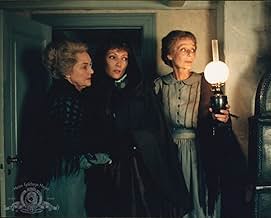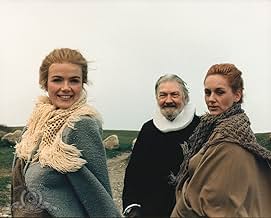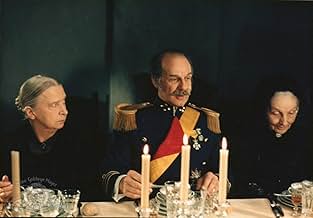IMDb रेटिंग
7.8/10
23 हज़ार
आपकी रेटिंग
अपनी भाषा में प्लॉट जोड़ेंDuring the late 19th century, a strict religious community in a Danish village takes in a French refugee from the Franco-Prussian War as a servant to the late pastor's daughters.During the late 19th century, a strict religious community in a Danish village takes in a French refugee from the Franco-Prussian War as a servant to the late pastor's daughters.During the late 19th century, a strict religious community in a Danish village takes in a French refugee from the Franco-Prussian War as a servant to the late pastor's daughters.
- 1 ऑस्कर जीते
- 11 जीत और कुल 8 नामांकन
Stéphane Audran
- Babette Hersant
- (as Stephane Audran)
Jean-Philippe Lafont
- Achille Papin
- (as Jean Philippe Lafont)
Ghita Nørby
- Narrator
- (वॉइस)
Asta Esper Hagen Andersen
- Anna
- (as Asta Esper Andersen)
फ़ीचर्ड समीक्षाएं
The 1987 Oscar winner for Best Foreign Film is an austere but ultimately joyous fable set on a desolate spit of coastline in northern Denmark, where for sustenance the puritan townsfolk rely first on prayer and afterwards on their daily ration of a thin, brown gruel made from soggy bread crusts and dehydrated flounder. But all that changes with the arrival from Paris of an attractive refugee (the story takes place during the French Revolution) who thanks her benefactors, and tests their strict religious principles, by preparing a sinfully delicious gourmet feast for the entire town. The meal is more than enough to tempt even the most devout ascetic, but of course the dour villagers do their best to look as if they're not enjoying each luxurious mouthful. It's rare these days to find a film so unafraid of simple virtues, without even a trace of malice or cynicism to spoil its bittersweet charm. In the end the gap dividing the villagers' spiritual and earthly appetites is happily bridged, proving again that few things (except perhaps a good movie) are as life embracing as a hearty meal.
Flawlessly directed, written, performed, and filmed, this quiet and unpretentious Danish film is an example of cinema at its best, and if a person exists who can watch BABETTE'S FEAST without being touched at a very fundamental level, they are a person I do not care to know.
The story is quite simple. In the 1800s, two elderly maiden ladies (Birgitte Federspiel and Bodil Kjer) reside in remote Jutland, where they have sacrificed their lives, romantic possibilities, and personal happiness in order to continue their long-dead father's religious ministry to the small flock he served. One of the women's youthful admirers sends to them a Frenchwoman, Babette (Stéphane Audran), whose husband and son have been killed in France and who has fled her homeland lest she meet the same fate. Although they do not really require her services, the sisters engage her as maid and cook--and as the years pass her cleverness and tireless efforts on their behalf enables the aging congregation to remain together and the sisters to live in more comfort than they had imagined; indeed, the entire village admires and depends upon her.
One day, however, Babette receives a letter: she has won a lottery and is now, by village standards, a wealthy woman. Knowing that her new wealth will mean her return to France, the sisters grant her wish that she be allowed to prepare a truly French meal for them and the members of their tiny congregation. The meal and the evening it is served is indeed a night to remember--but not for reasons that might be expected, for Babette's feast proves to be food for both body and soul, and is ultimately her gift of love to the women who took her in and the villagers who have been so kind to her.
The film is extraordinary in every way, meticulous in detail yet not overpowering in its presentation of them. As the film progresses, we come to love the characters in both their simple devotion to God and their all-too-human frailties, and the scenes in which Babette prepares her feast and in which the meal is consumed are powerful, beautiful, and incredibly memorable. There have been several films that have used food as a metaphor for love, but none approach the simple artistry and beauty of BABETTE'S FEAST, which reminds us of all the good things about humanity and which proves food for both body and soul. Highly, highly recommended.
Gary F. Taylor, aka GFT, Amazon Reviewer
The story is quite simple. In the 1800s, two elderly maiden ladies (Birgitte Federspiel and Bodil Kjer) reside in remote Jutland, where they have sacrificed their lives, romantic possibilities, and personal happiness in order to continue their long-dead father's religious ministry to the small flock he served. One of the women's youthful admirers sends to them a Frenchwoman, Babette (Stéphane Audran), whose husband and son have been killed in France and who has fled her homeland lest she meet the same fate. Although they do not really require her services, the sisters engage her as maid and cook--and as the years pass her cleverness and tireless efforts on their behalf enables the aging congregation to remain together and the sisters to live in more comfort than they had imagined; indeed, the entire village admires and depends upon her.
One day, however, Babette receives a letter: she has won a lottery and is now, by village standards, a wealthy woman. Knowing that her new wealth will mean her return to France, the sisters grant her wish that she be allowed to prepare a truly French meal for them and the members of their tiny congregation. The meal and the evening it is served is indeed a night to remember--but not for reasons that might be expected, for Babette's feast proves to be food for both body and soul, and is ultimately her gift of love to the women who took her in and the villagers who have been so kind to her.
The film is extraordinary in every way, meticulous in detail yet not overpowering in its presentation of them. As the film progresses, we come to love the characters in both their simple devotion to God and their all-too-human frailties, and the scenes in which Babette prepares her feast and in which the meal is consumed are powerful, beautiful, and incredibly memorable. There have been several films that have used food as a metaphor for love, but none approach the simple artistry and beauty of BABETTE'S FEAST, which reminds us of all the good things about humanity and which proves food for both body and soul. Highly, highly recommended.
Gary F. Taylor, aka GFT, Amazon Reviewer
Stephane Audran is the eponymous heroine of this beautifully measured study of a small Danish community towards the end of the last century. Two beautiful and musically talented sisters give-up their own prospects of happiness and marriage in order to look-after their ageing father. One day, a French woman, Babette, comes to work for them. After some years she wins the lottery and is determined to do something for the sisters who have taken her in. Her solution is to prepare an exquisite and sumptuous feast, which changes the lives of all those invited. This is a film about human and cultural interaction, reflected in the changing language of the dialogue from Danish to French, and especially between the dutiful sobriety of Protestant northern Europe and the sensuousness of the Catholic south. It is also about human needs, and how warmth and kindness can be expressed and stimulated through the cultivation of the senses. A profoundly uplifting film.
This movie came aside as a shock in the eighties.Far from trends,that is to say in the heart of sincere creativity,Babettes gaestebud stands as one of the finest movies of its time.Stephane Audran,the wonderful actress of her ex-husband Claude Chabrol's greatest achievements (le boucher,la rupture,les noces rouges,all unqualified musts for movie buffs)gave a lifetime performance.To see her prepare with love and affection her meal is a feast for the eyes.All the people who saw this masterpiece actually tasted,ate Babette's culinary triumph. But the most moving part of the story is its conclusion:Babette was a great French chef,she was famous,now she found a new homeland but her heyday is behind her and she won't never be allowed to come back to her dear France.So the two old sisters do comfort her:In heaven,there will be huge kitchens where she'll cook for eternity.While sharing her fortune with her new friends,Babette changed their life,she gave them pleasure and a magic evening they would remember forever.In this simple but extraordinary screenplay,human warmth is everywhere,and I wish everybody a Babette's feast,would it be only for one starry night...
"Babette's Feast" proves that not all film theories and formulas are true 100% of the time. Here's a story where there is no life-or-death conflict, no raging anger, no violent outbursts. Nothing blowed up real good, and there is nothing resembling a chase scene. The conflict is about the ways in which people can be nice to each other. Their personal differences of passion or conviction are not as important as the ways in which they can connect with each other.
How shockingly refreshing.
There is an undercurrent to this film that gives it the feel of a Garrison Keillor monologue, in that it is built around people's personal foibles and quirks.
Even more refreshing is how "Babette's Feast" manages to be nice without becoming cloying, saccharine, facile, superficial or insincere. People's personal passions are portrayed not only from their own perspective, but from the perspective of the people they affect, with more realism than you usually get in film, yet also with sincere and infectious optimism.
If you don't come away from "Babette's Feast" smiling and feeling better, then you must have been distracted from giving it your full attention. This is one of those very rare films that you can recommend to everyone you know. It is truly in a class by itself. Like Mary Poppins, "Practically perfect in every way."
Utterly charming and subtly stunning.
How shockingly refreshing.
There is an undercurrent to this film that gives it the feel of a Garrison Keillor monologue, in that it is built around people's personal foibles and quirks.
Even more refreshing is how "Babette's Feast" manages to be nice without becoming cloying, saccharine, facile, superficial or insincere. People's personal passions are portrayed not only from their own perspective, but from the perspective of the people they affect, with more realism than you usually get in film, yet also with sincere and infectious optimism.
If you don't come away from "Babette's Feast" smiling and feeling better, then you must have been distracted from giving it your full attention. This is one of those very rare films that you can recommend to everyone you know. It is truly in a class by itself. Like Mary Poppins, "Practically perfect in every way."
Utterly charming and subtly stunning.
क्या आपको पता है
- ट्रिवियाFirst Danish movie to win an Academy Award for best foreign language film.
- गूफ़In 1871 Babette pays with skilling, which was the currency used at that time; 14 years later, Babette still uses skilling, but Denmark changed the currency in 1875 from skilling to kroner and orer.
- कनेक्शनEdited into Eventyret om dansk film 18: Nye perspektiver - 1970-1987 (1996)
- साउंडट्रैकWaltz No. 15 in A-flat major Op. 39
(arranged for orchestra) (uncredited)
Written by Johannes Brahms
Played during the dance hosted by the Royal family
टॉप पसंद
रेटिंग देने के लिए साइन-इन करें और वैयक्तिकृत सुझावों के लिए वॉचलिस्ट करें
विवरण
बॉक्स ऑफ़िस
- US और कनाडा में सकल
- $43,98,938
- दुनिया भर में सकल
- $46,37,920
- चलने की अवधि1 घंटा 43 मिनट
- ध्वनि मिश्रण
- पक्ष अनुपात
- 1.66 : 1
इस पेज में योगदान दें
किसी बदलाव का सुझाव दें या अनुपलब्ध कॉन्टेंट जोड़ें
































